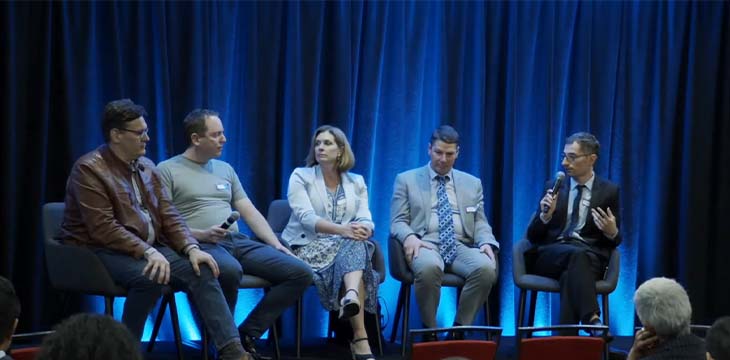|
Getting your Trinity Audio player ready...
|
What services and efficiencies can blockchain deliver to businesses? That was the main question various academics and Bitcoin SV (BSV) entrepreneurs answered at today’s Blockchain in Business event in Sydney, Australia. The most important issues, presenters agreed, centered around keeping verifiable records on a permanent and trusted ledger—one that must have the ability to scale to meet the Big Data the world needs.
The “universal ledger of truth” concept is familiar to the BSV blockchain industry. Using the world’s first blockchain, Bitcoin, its developers have proved it has the ability to record and process as much data as its network can generate. As it continues to scale and absorb more applications, BSV will create new efficiencies by automating data gathering, creating new economies with micropayments, monetizing data, and providing effortless auditing.
If any of the presentations are of particular interest, a recording of the entire one-day event is available here.
How to bring businesses on board
Challenges the industry needs to face include convincing the (non-blockchain) business world of its benefits and creating easy on-ramps for enterprise and consumer users that don’t demand technical knowledge or costly integration processes. It also needs to demonstrate that the technology is rock-solid secure and show why an open and public blockchain network is superior to any “private blockchains” that have enticed newcomers in the past.
“Business will operate on the blockchain,” said host Eli Afram in his opening lines. It’s a logical conclusion based on blockchain’s near-100% uptime and a guarantee that timestamped information may not be deleted once recorded. Mistakes can be corrected with new information, but BSV applications will always keep an auditable record of who changed what and when.
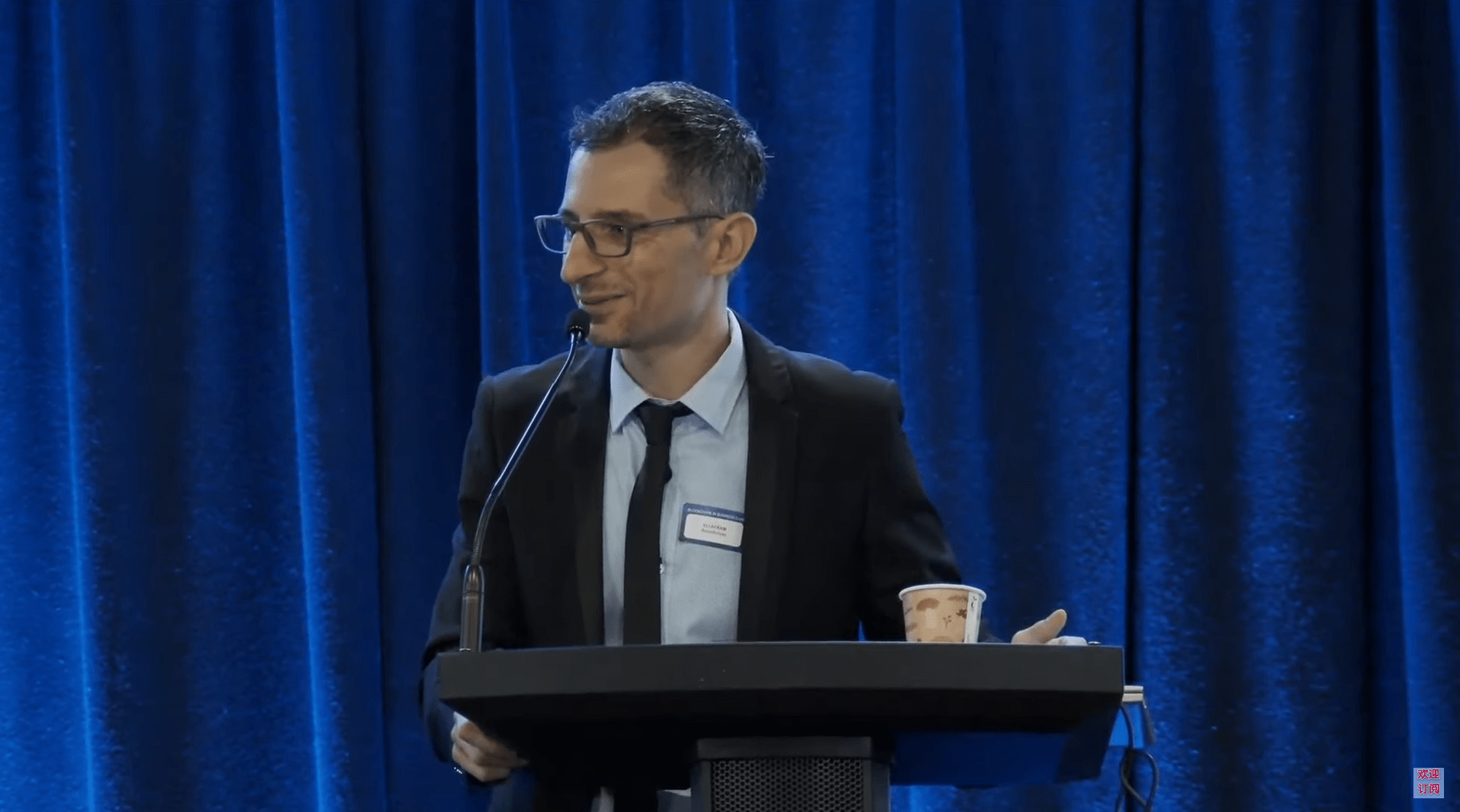
Afram is also the founder of AnonSurvey, a user-friendly interface to create surveys with applications for both business and government. He described it as similar to a transparent voting box in which one could see all votes, including their own, and prove their authenticity without necessarily knowing the final result or who voted for what. Results from such a survey/election could be tallied within seconds of the poll closing, and results may be audited and analyzed years into the future.
The ability to make data secure while maintaining confidentiality when required is a major challenge in the Big Data world. BSV does this with the ability to encrypt and decrypt data based on permission levels and, more recently, with bleeding-edge Zero Knowledge Proof (ZKP) protocols. This addresses a significant issue large data users might have with public/open blockchains.
Other presenters showcased various applications that all address the data needs mentioned above. Some will be attractive to data gatherers and evidence, while others have a more social media-friendly face and are designed for everyday people. In a refreshing break from most “crypto” conferences, most presenters focused on Big Data apps and didn’t mention speculative digital asset trading, which has for years created an undue amount of hype and scandal for the wider industry.
Business processes and the Metanet
James Belding of Tokenized showed how various permissioned business functions can be integrated into a single interface. His company’s “tokens” aren’t the kind you should, or even could, trade on markets—they’re things like voting rights, ownership records, and due diligence requirements.
“We can usher in true automation across the board,” Belding said, as well as eliminate data silos and reduce fraud.
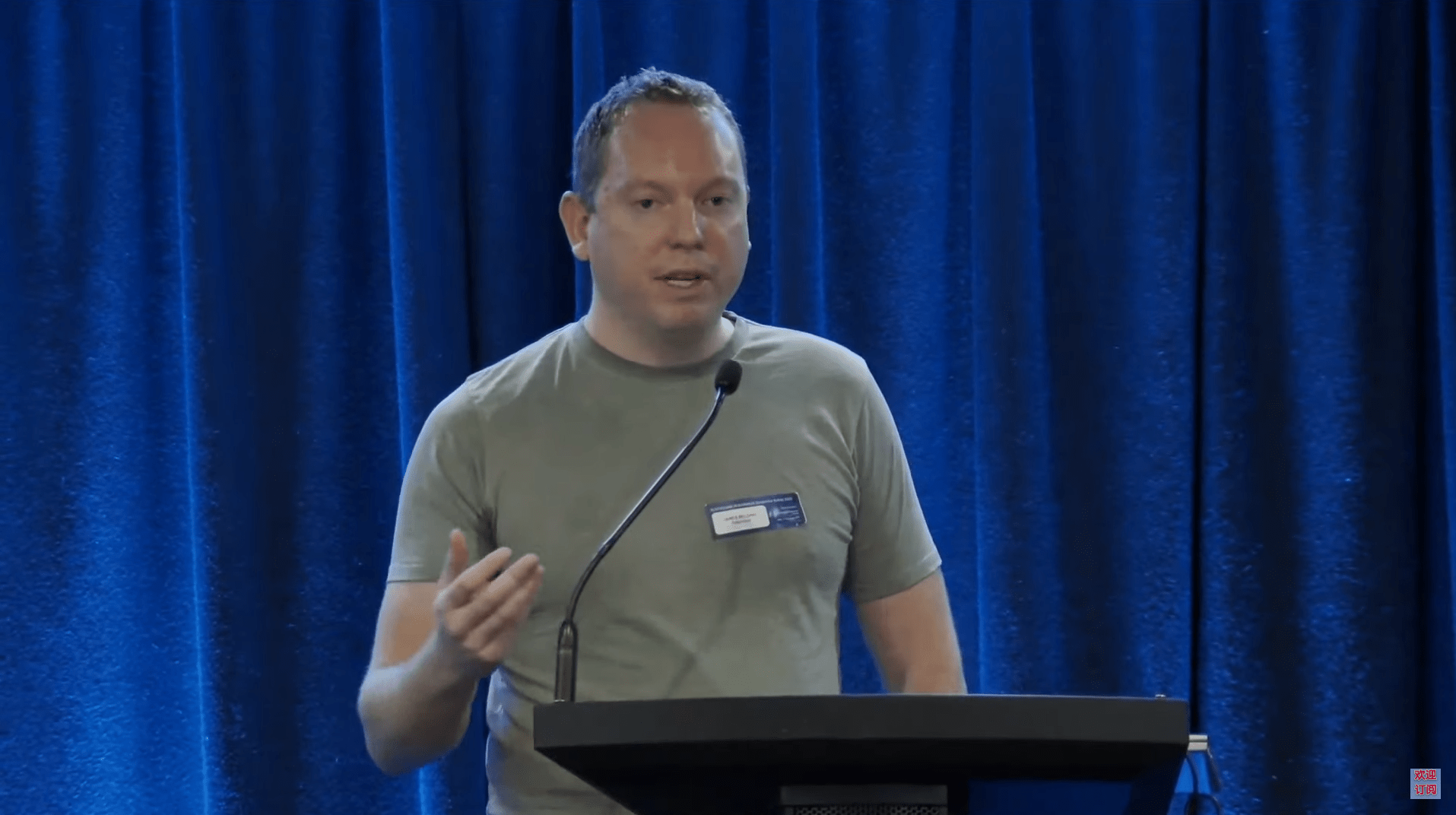
His very detailed presentation covered a lot of ground, showing how parties to contracts can sign a “master agreement” defining components and inputs. It would set the rules for managing, freezing, confiscating, or removing digitized assets, set oracles to determine automated outcomes, and set permission levels. Tokenized’s main advantage is in simplifying (and “templatizing”) these processes and making them accessible to everyone while maintaining levels of legality and security that would satisfy both regulators and courts.
Elas founder Brendan Lee continued in this vein with a talk on BSV’s Metanet Protocol, a data structure protocol that enables new ways for information to interact on the blockchain’s transaction-based data entry model. He mentioned DAGDA Tools, aka the Directed Acyclic Graph Data API that turns packets of raw data into transactions, a “second layer DAG overlay” that anyone can use to create Metanet-based applications, some of which Elas is already deploying today.
Big, Big Data applications
Paul Chiari of Metastreme and Daniel Keane of PredictEcology represented the big-as-in-massive side of Big Data, using Internet of Things (IoT) data-gathering devices that record hundreds of thousands (and many more) of new data records as microtransactions per day. Chiari described some of the hurdles and bottlenecks he’s encountered with Metastreme and applications like WeatherSV, and highlighted the need for scaling that remains fast and cost-effective.
The BSV blockchain can be used for any product or service, Chiari said. Its records guarantee data veracity and provide an audit trail, creating new markets for a data economy through “the fusion of money and data.” The key to this is SPV, he noted, to ensure all transactions remain verifiable without every user needing to keep a record of the entire Bitcoin blockchain.
Keane spoke about PredictEcology‘s efforts to turn all this into data records that provide real benefits to humanity. While “protecting the environment” has become a buzz phrase, all actions may have serious health and economic impacts down the line that can’t be understood without complete and large-scale data records.

“Everyone’s life is affected by ecological data,” Keane said, and ecology is complex. A massive amount of work goes into producing Environmental Impact Statements (EIS) for specific projects, he said. But after completion, the data is often “siloed” or locked away in places where potentially useful data remains inaccessible to others. Blockchain recording means the data collectors may retain ownership and even monetize the data they gather, creating new industries.
The value of data for consumers too
LaMint’s Morgan Coleman also spoke about data monetization, though of a different sort. LaMint is more of a social network designed to build new income streams for social media creators. Using his wife’s social media influencer career as an example, he noted that while the “creator economy” is worth $104 billion and growing, most of that money flows to platform providers (like Facebook or Instagram) while hard-working creators struggle for free to build audiences in the hope of advertising to them. Less than 1% of creators are ever able to make a living this way, he noted.
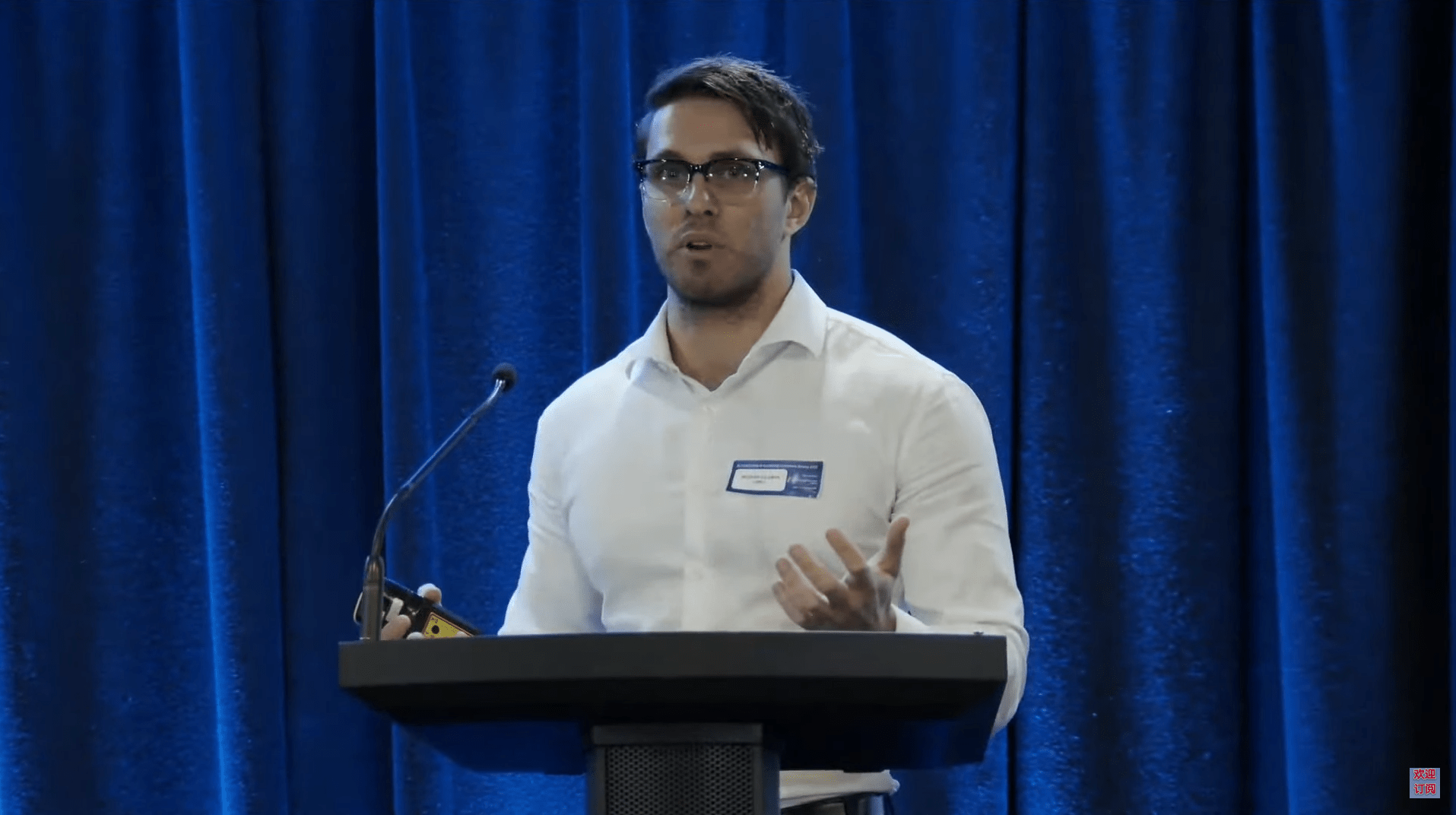
LaMint provides nine revenue streams for creators and is working on more. Coleman showed a bell curve of social content monetization, saying LaMint is aiming for the top 20% rather than just the 1%. Another advantage is performing small/micro-transactions and sending instant payouts. Users will soon be able to turn these instantly into cash via LaMint’s BSV debit card.
There’s also a value to some data that isn’t monetary. Michael Choi of MyFabula described how his application records users’ entire life stories, accessible for your survivors and descendants to examine. The idea came, he said, from visiting cemeteries in remote towns and noticing how tombstones had become smaller and less detailed over the years. It’s like your whole life turns into a simple plaque and a couple of dates once you’re gone, he said.
MyFabula (based on the Latin word for “saga” or “story”) gives everyone a chance to tell their entire life story, or as much of it as they want to tell, after all, it’s your life. They can use rich media like video, audio, and text to record them and decide who sees what. Some may have secrets or sensitive information about themselves they’d still like to restrict for a specific period, he said. For this reason, MyFabula has sections like “auditorium,” a “library,” and “memorial hall,” but also a “vault.”

Blockchain in general for the agnostics
Other presenters and sessions took a more general look at blockchain technology and how it can be applied in business, as well as addressing some of the businesses’ current concerns.
Tim Do of Realbox.io (which actually runs on the Binance Smart Chain) spoke about applications in the real estate world, while Macquarie University’s Dr. Cynthia Cai introduced the concept of triple-entry accounting in business. Drs. Sushmita Ruj and Eric Lim from the University of New South Wales (UNSW) spoke on the importance of data proofs, both generally and in the world of tokenized assets as non-fungible tokens (NFTs). The audience still appeared to have a strong interest in digital asset trading markets, with Anna Clive of BTC Markets (one of Australia’s oldest and largest exchanges) fielding several questions about compliance, taxation, and regulation, and how the recent FTX collapse could impact activities.
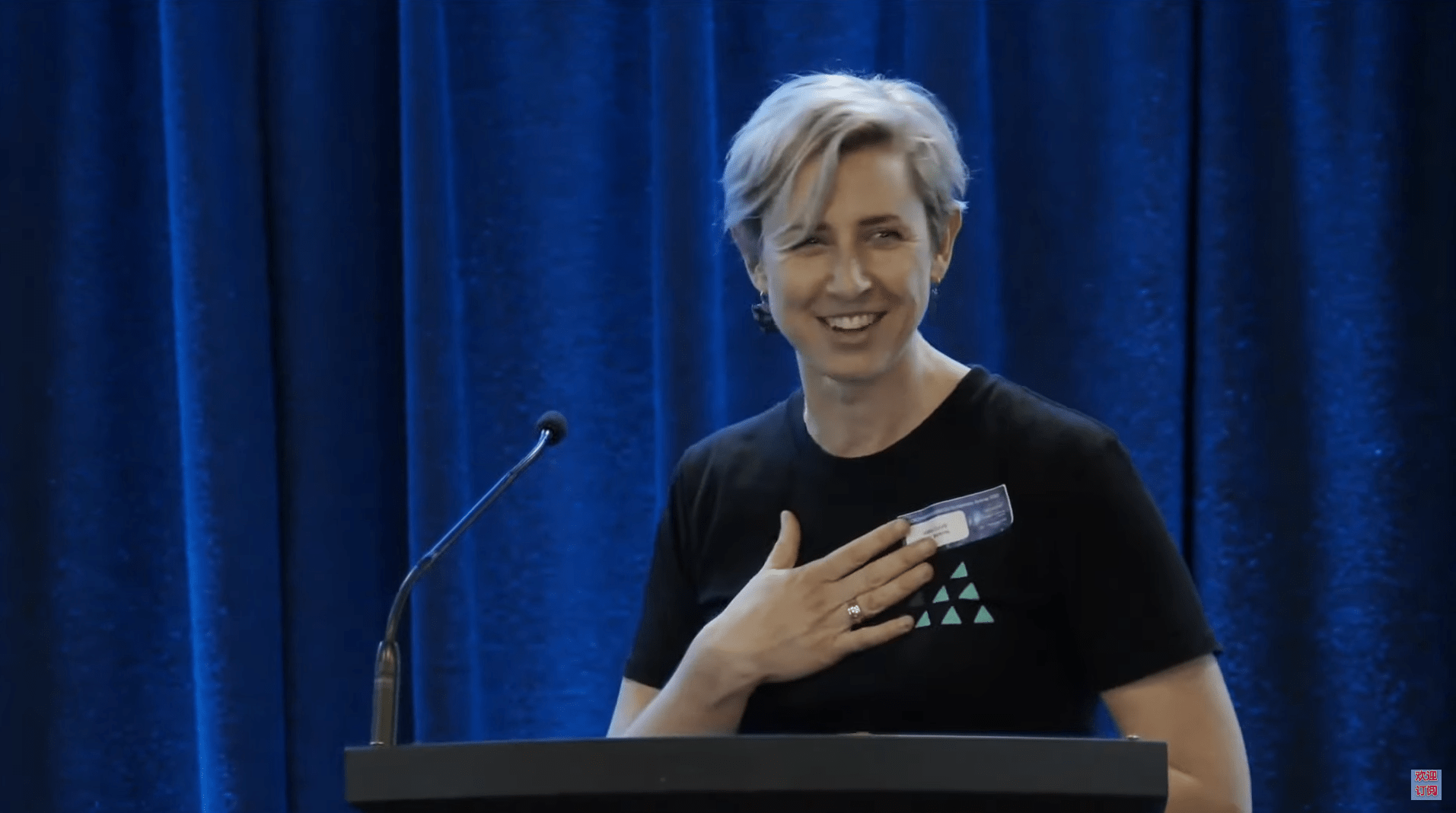
Anna Clive, Chief Operating Officer of BTC Markets
A few noted that the business world and its needs remain conservative, and Macquarie’s Dr. Cai described her work as “very conservative,” involving “very traditional capital market research.” She noted that while many people are working on triple-entry accounting systems, some are trying to create entire ecosystems from scratch, and “without users, they are useless.” Claudelle Taylor of CIMIC represented the construction industry in a panel discussion, saying that industries with high volumes and profit margins need to see real practicalities and efficiency gains before joining the blockchain world. Brendan Lee urged those working in the blockchain industry to avoid the public rhetoric surrounding Bitcoin and speculative digital asset trading, saying “that is a sideshow, a bit of a carnival, really.”

Dr. Cynthia Cai of Macquarie University
Overall, the event described a cautious-but-optimistic business environment for blockchain, with ordinary users keen to learn more but still unsure about the best ways to join in. Events like this, which the Australian BSV intend to hold regularly, will hopefully bring new users by showing off benefits and how they’re becoming more user-friendly.
Watch: The BSV Global Blockchain Convention panel, Re-Inventing Business with Blockchain

 02-15-2026
02-15-2026 
